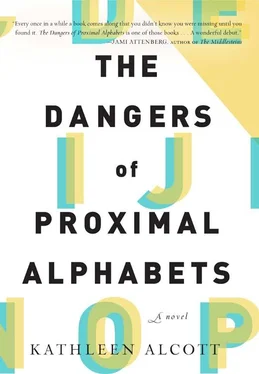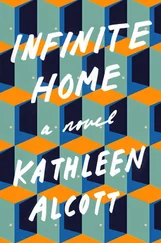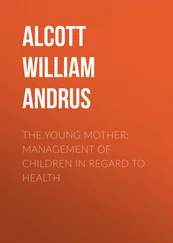My father picked up with a cheery clearing of the throat and a singsong “I was just thinking of you.” When I asked how he was, he said that everything was quite good; autumn had always been his favorite time of year, Julia’d tried her hand at mulled wine and they’d indulged heavily the night before (much background laughter on her part at this one), and his lungs had actually been feeling better than they had in months!
I never called out James on his lie, knowing he must have been off on a pretty terrible vacation to tell it. I called his landline — he has never and probably will never have a cell phone — about six times, with increasing frequency, but I never reached him and for some reason I just believed and hoped he was all right and just out on a walk instead of taking the bus over there or calling my father and Julia back to fill them in. It’s ridiculous the way all three of us retained that childhood bond of keeping secrets from the adults no matter the cost, insisted on naming it us versus them when it had become so clearly us versus us, when we as a unit had ceased to function in any benefit to each other and instead just rolled around like marbles waiting to be arranged.
The scary-long walks as opposed to the standard: they were a strong indicator that the just plain sad, which landed James once in the hospital and then in pretty regular therapy and an antidepressant haze, had mutated into something else. In the same us-versus-them philosophy we used with Julia and my father, I didn’t tell James’s therapist about the phone call in which he revealed his little project of writing eulogies for the living. Neither did I tell his therapist or our parents about the other increasingly terrifying phone calls and incidents. Sadness is one thing, insanity another, and the second I’ve so romanticized and linked with many other things (like beauty and art and love ) that it was hard isolating it from the rest, holding it up to the fluorescent and brutally honest lighting it required.
He told me, at one point, that he was considering getting rid of his books. When I asked why, he told me nonplussed that he was holding a new belief that with so many old stories around, no other stories could be created. This was poetic up until he told me how long “it has been Tuesday.” He was convinced the books were linked to time, if only his conception of it; he mentioned that naturally his time was different from mine. Something sick had made a home in his head, and it had named itself after a day of the week and lent itself to his obsession.
I got off the phone and repeated his words in my head. Things become understandable with familiarity, and so I thought: It has been Tuesday for so long. It has been Tuesday for so long. It has been Tuesday for so long . I wanted to discern, but couldn’t, and it was then I admitted that James’s own personal Tuesday cage was something much beyond poetics or standard feelings of emptiness and worthlessness.
Despite my omissions, despite James’s talents for manipulation, he ultimately garnered a new diagnosis. “Borderline personality disorder” is a term that scares most people, but for all of us it was a relief, a label, a home. It framed his love affair with speed and called that compulsive behavior, named that haunting distinction he had held over time and Tuesdays an inflated sense of self. James finally had the license he’d been driving without illegally for so long — or rather, walking. We learned this after his walks became increasingly scary, and more than once did I have to take a cab to a strange neighborhood where he had somehow managed to find one of probably seven remaining pay phones in the city. Finally one evening, unable to see any beauty in his lost, incapable of branding it special, I called Julia and my father.
He lives at their house now and is mostly happy, his whims indulged, all the time to write songs he can manage and a ration of two beers a day (against doctor’s orders but my father insisted the man be allowed his hops). He is frustrated by not being able to go more than a couple blocks alone, but it being our hometown he pretty intelligently realizes he knows it all intimately and so is content to bake with Julia or just eat her baking, excel at the crossword puzzle and put it on the fridge, watch a marathon of The Twilight Zone .

Airports and airplanes, to me, still seem like the happy future we’ve all been told so much about. So many small pleasures exist in hurtling toward the ones we miss: the cheerful assistance of the steel moving walkway, the ready availability of anything we might need in miniature or in excess, the series of immaculate and anonymous spaces. Today is dark and I should not find joy in so many colors of toothbrushes, their frills reduced to syllogism — you will find no tongue scraper on this product, sir, only reds and blues and simple utility — but I can’t help it.
Today is dark and I should not take pleasure in the toilets that flush so promptly and politely, but I cannot help but find them kind and I thank them silently for removing the evidence I was there. I may be losing my mind.
I am hurtling toward what, today? What will I answer if a kind old woman happens to sit next to me in seat 17C (aisle)? Am I allowed to simply state, “Going to see my father”? And why should I feel guilty for not revealing the very whole truth to a woman I don’t know and will never see again? Why should I let my time in the air be about a funeral? I have paid several hundred dollars for the clear space, the small oval window, the seat designed to recline farther than ever, the odd-sized can of Coca-Cola, and I intend to enjoy them anyway I please.
I am going to see my father today, though he promises to look very much different and remain silent. That ghostliness aside, today I am also hurtling toward Jackson; I will see him for the first time in two years, four months, and sixteen days. When he began calling so casually seven months ago, just after I finally exited the city we’d called ours, I never once said: Please explain yourself. Please help me to understand what you did to me, what I did to you, what we did to each other. Instead I rose to the occasion of witty banter, and when he mentioned her I covered the mouthpiece so he would not hear the gnarled cough-sob that escaped without my permission. I was esoteric and clever and not actively kind, and made every effort to receive his phone calls but not dial his number and generally achieved the flippancy he had provided as the tone of our telephone interactions.
Oh-ha-ha, how very funny it all was — that the problem had ceased since us but he was pretending it hadn’t in order to save his ass. What a terrible person I am, he mused, and I laughed with him as if I hadn’t been directly ravaged by his terribleness. It was my fault just as much as his: I gave him permission to walk right back into the us versus them we’d spent so many years practicing.
I let him drop her name, her boring Midwestern name with its bland consonance, and said nothing when he went on about her virtues, how he didn’t quite appreciate them as much as he should, but was trying; how he knew blaming it on the sleepwalking was immoral but felt she’d be more hurt if she knew the full truth; how he just didn’t think she could handle that sort of pain and so it felt like the only option. And I didn’t need to say — then why not leave her? He answered that, too, as if I had asked: “She’s the sort of person I should love, I, and I think I will if I work at it.”

Читать дальше













